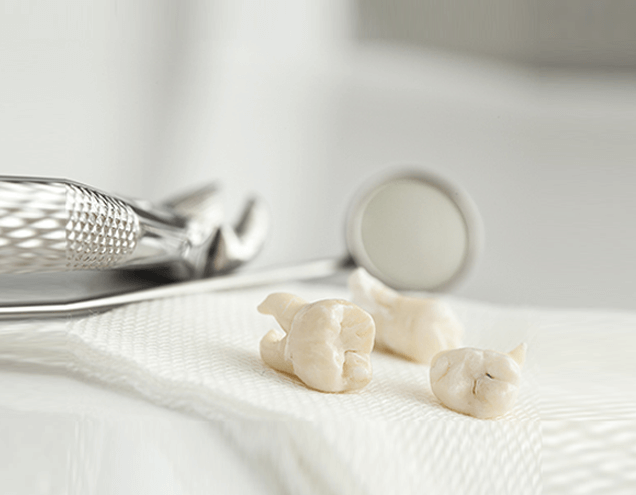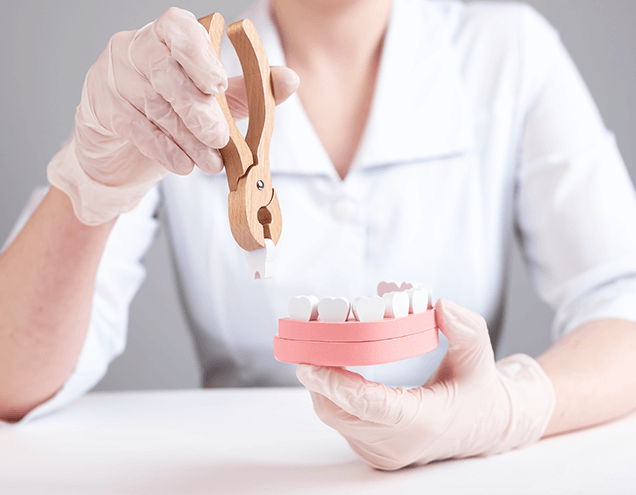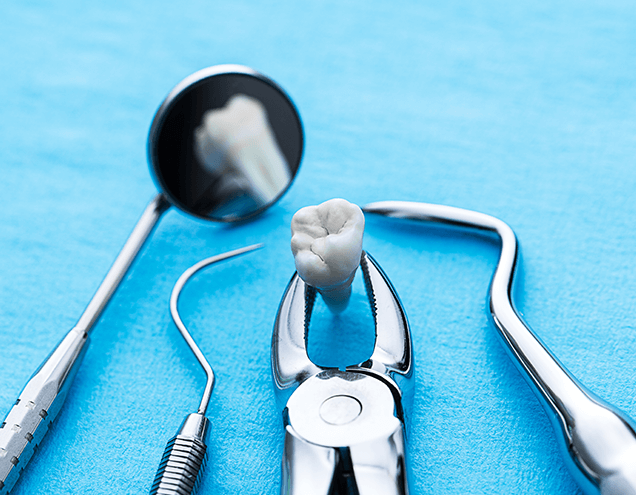

If your tooth gets damaged, decayed, or diseased over time, it may need to be extracted. We offer quick, safe, and efficient tooth extraction services, including wisdom tooth removal, to help you reduce your pain and discomfort.
Our skilled and experienced team strives to make the tooth extraction procedure as comfortable and pain-free as possible. We also provide emergency tooth extraction with a same-day appointment for quick relief from pain and discomfort. We will always help a new or existing patient the same day if in pain or if not comfortable. We have seen proudly serving Scottsdale, Tempe, Mesa, and Phoenix for over two decades!
Request an Appointment Now!
Tooth extraction is recommended for various reasons, including:
At Smile Arizona Dentistry, we also provide emergency tooth extraction services. You should seek our emergency dental assistance if:

Our trained and compassionate team will explain the entire tooth extraction process and answer any questions you may have about the procedure.
We will complete a short consultation session before the extraction process. During this consultation, our dentist will take an X-ray film of the infected tooth. You may receive certain medications on the day of your procedure to minimize swelling and post-operative pain. You are given local, I.V., or general anesthesia before the tooth extraction, depending on your preference and oral and general health condition(s).
During the extraction process, the tooth may simply need to be “wiggled” out, or a small incision is made in your gums to reach the infected tooth, remaining root, and/or jawbone. Then, it will be removed using dental instruments.
We will use clotting medications, gauze pad, or suture the wounds to control bleeding and promote quicker healing as necessary for your condition(s). You are recommended to come to us for a follow-up visit after about a weeks’ time to check whether the extraction site has healed well and or remove any stitches that do not dissolve.

Wisdom teeth are the final set of molars that develop in the gums between 17 and 25 years of age. These teeth can be valuable to your mouth only when they are properly aligned and fully grown. Otherwise, wisdom teeth should be removed.
You may need to undergo wisdom teeth removal if:

Before the procedure, you are given local, I.V., or general anesthesia sedation depending on your choice, level of comfort, and the complexity of your wisdom teeth removal.
During the procedure, we will remove the teeth in the least invasive way possible. This can include making an incision in the gum tissue to expose the bone, teeth including removing any bone that blocks access to the tooth and/or root. Then, dental instruments are used to remove wisdom teeth either in whole or by pieces. The extraction site will be thoroughly irrigated and cleaned to prevent infections.
Follow-up visits are required to check for any signs of infection and prevent complications that lead to serious problems.
Extracted or missing teeth can negatively impact your oral health and appearance. (Of course one does not replace third molars or wisdom teeth!) We have various teeth replacement options that can improve your oral health and appearance, including:
A dental implant is a replacement tooth root that is surgically placed into the jawbone. It is an effective option for replacing single or multiple extracted teeth. Implants will give a more natural appearance and functionality. We can customize your implants depending on your conditions and preferences.
Learn more about the dental implant solutions that we have to offer.
Dental bridges can be used to close the gap created by one or several missing teeth. A bridge can be supported by implants or surrounding teeth. Bridges will look natural and can be easily cleaned and maintained. They are attached in your mouth and non-removable by the patient.
Learn more about dental bridges.
Partial dentures are a less expensive and non-invasive teeth replacement option. They can be used to replace one or more missing teeth either in your lower or upper jaw. You are recommended this option only when your remaining teeth are healthy and can provide adequate support to the partial dentures.
Learn more about our denture services.
Tooth extraction is necessary if your tooth:
If the damaged or broken tooth is not removed, you may experience serious complications, including damage to the adjacent teeth, bone, and gum tissue. One can even die from an untreated dental infection where a tooth extraction was indicated. Always take your oral health seriously and ask questions if you do not understand your diagnosis and recommendation(s).
Yes, an infected tooth can be extracted if it cannot be restored by a root canal procedure. An infected tooth often is sensitive to touch and may cause intense pain, so removing it will prevent further oral problems. It is important that you take antibiotics as directed after this type of procedure.
An infected, inflamed, or loose tooth usually causes pain. If your pain is severe and persists for a long period, extraction may be the only way to stop the pain and spread of infection.
You can yourself drive home if local anesthesia was used for extracting your tooth/teeth, as the effects of local anesthesia will wear off within a few hours. However, you cannot drive yourself if you had I.V., general anesthesia or if a sedative drug was used. We will ask that you bring a driver with you to the appointment and stay in the office throughout your care so that you are able to leave when the doctor has cleared you.
A root canal is generally the preferred choice, as it can fix and restore your natural tooth. Nothing replaces a natural tooth (but we have some pretty good second choice options!) Tooth extraction is recommended if a tooth cannot be repaired or restored. Tooth extraction is less expensive, but then you should replace your missing or extracted teeth with implants, bridges, or partial or full dentures.
You can get teeth “pulled”/extracted or undergo root canal treatment depending on your oral health condition and requirements. Both can improve your dental health and prevent further dental problems.
You should chew foods on the opposite side of your extraction site for the first 3 to 4 days. After that, you can slowly introduce solid foods and start chewing them on the extraction site. If you feel uncomfortable, wait for another one or two days.
Yes, an experienced general dentist can extract all teeth in your mouth. In fact, most teeth are extracted in general dentistry offices. If you have a complication or potential complication or a complex medical history, we may be referred to an Oral and Maxillofacial Surgeon, a dental specialist.
Everyone does not require removing wisdom teeth. However, wisdom teeth extraction is necessary when they are impacted, not positioned properly, or trapped/partially trapped in your gums or jawbone.
If you delay your wisdom teeth removal, you may experience dental problems such as infection, toothache, tooth decay, tooth abscess, orthodontic problems, and gum disease. Also, as the root tips form, they can grow closer to a nerve canal in the jaw bone. Generally, as soon as it has been recommended to you to have the extractions, this is the best time to have the procedure done, risking the least amount of possible complications.
Click on the button below to request your dental appointment with Smile Arizona Dentistry today!